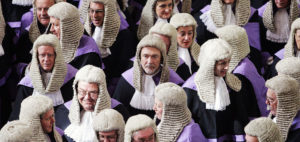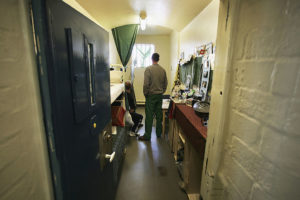“Actually the judge’s analysis of the applicable guidelines is wholly unimpeachable. You’re welcome.” Legal Twitter’s centrist bellwether The Secret Barrister heard your petit bourgeois whining about criminals being given nothing more than a slap on the wrist and is making noises on your lawn.
After educating the ignorant and correcting the mendacious on inefficiencies and unfairnesses in the Criminal Justice system these last several years, he now has two bestsellers and half a million Twitter followers to his name. But the big reveal in his new book is that he, too, was once a sinner. An “ardent Daily Mail reader” at university, we are told that “soft sentences infused me with fury”. Then he beat a path to the Criminal Bar. (“I’M GOING TO BE A FUCKING BARRISTER!” he screams in “uncontrollable hysteria” when his pupillage offer lands.) And, over the course of his early years in practice, he sees the light. Nothing But The Truth — his third book, and an autobiography of sorts — tells the story of a moral awakening.
Observing that his “new creed” is now “the dominant strain of ideology” in the profession, he suggests that “there is something that this job does”. In my experience, this is true: the human moral compass — a motley collection of powerful emotional heuristics — did not evolve to navigate the business of prosecuting and defending alleged rapists and murderers. Doing so can shift a barrister’s focus, I think, away from judgment and towards a Taoist acceptance of The Way Things Are.
But that isn’t what the Secret Barrister is talking about. Rather, he is looking to explain his conversion to Progressivism.
Of course, in trying to establish causation, he neglects the base rate: everyone has become more progressive in recent years — barristers, ballet dancers, even Daily Mail readers. Especially Daily Mail readers. An intelligent, aspirational middle-England millennial abandons cumbersome provincial baggage on his ascent to a high-status job: this is no revelation.
As the author himself acknowledges: “It may of course be that mine is nothing more intriguing than a tale of subconscious conformity. Of a weak-willed youngster uncritically devouring the ideological gruel of their industry”. He does this a lot: spiking an objection by caricaturing it only slightly — but enough to make it unattractive. Not quite a straw man then, but perhaps a wicker man. For a tricky plea-in-mitigation, you could do a lot worse than this fellow.
And if his swing-o-meter did shift more than most when he started blogging in the early teens of this century, a cynic might observe that that was when questioning the progressive orthodoxy became a hazardous enterprise among the professional classes, and when those in search of a large, publicly appreciative audience needed to pivot.
But the most disappointing misrepresentations have to do with class. At Bar School we meet the “Three-Piece Suit Wankers” who choose to wear “the obligatory public school tie” when everyone else is in jeans. In his early days in practice, our hero looks after a cocky work experience lad, “six foot three, public school tie” (that again), who in response to a witness’s pre-court question silences the SB with an outstretched palm and declares, “I’ve got this one”. The overbearing sky-scraper even boasts of his reliance on nepotism: “When fair and open competition did not bear fruit, a quick phone call from daddy straightened out any misunderstandings, he haws.”
Nothing But The Truth tells of applicants only a decade ago “whose lineage made it impossible for chambers to refuse them”; of the “institutionalised assumption that all aspiring barristers were born choking on platinum cutlery”; and of the “institutional reluctance… to ask ourselves whether it’s right, in the justice system of 2022, that blood remains thicker than water”.
Choose to believe this stuff if you want, but it is no more representative of the modern criminal bar than Mervyn Griffith-Jones in the Lady Chatterley trial talking to the jury about his servants. Any edition of Counsel magazine from the last 20 years will confirm that it is nothing like the truth. Public self-flagellation may serve some purposes, and yes, there is more work to be done. But public schoolboys encounter one another at court these days with all the noisy enthusiasm of former participants in an unsuccessful one-night stand, or veterans of an unpopular war.
The question arises, why paint this inaccurate portrait?
Well, the Secret Barrister is a creature of social media, and has become an avatar: reliably representative of mainstream opinion, or at least of the publicly expressed opinions of the minority of the profession which uses Twitter. His credibility and popularity has benefitted from endorsement by senior colleagues, many of whom are of a generation for which the struggle against a reactionary hegemony is slightly less mythological. Sticking it to the forces of conservatism is as much their obsession as his. Will Lloyd’s description of Centrist Dads comes to mind: “they still carry on like they are hated by an establishment full of port-soaked aristocrats and Thatcherites who want Nelson Mandela to stay in prison”.
There may be a more personal reason for him to take this line. It is evident that the author is clever, ambitious, and highly sensitive. Solipsistic, self-righteous, egotistical, timid, paranoid, brittle — these are all adjectives he applies to himself in the book, most of them repeatedly. If there is any truth in this self-deprecation, could it be that the only possible impediment to his professional success — nepotism — is a monster that takes on exaggerated proportions in his perception of reality?
And he does at least deploy his disarming postscript thing again: “Some of my alienation may well have been attributable to my own shyness and awkwardness, of course… All the grown-ups present… went out of their way to emphasise how welcome we all were.” Oh right. Perhaps the Bar isn’t so cliquey after all.
Class interests are persistent and mercurial, but exaggerating a problem doesn’t help solve it. One third of new entrants to the Bar attended private school. The national figure is 7%. Even allowing for applicants on scholarships and bursaries — and for the possibility that private schools currently provide, on average, a better education — this indicates a problem: privately educated candidates are surely not several times more likely to be the best person for the job. If exam results are not a reliable guide, it can be difficult to work out who is the best, but it is in Chambers’ interests — and society’s — to do so. What is not in society’s interests, or working-class candidates’ interests in particular, is to entertain Twitter liberals by giving the false impression that the Bar continues to operate like a 19th Century Guards’ regiment.
There is an interesting collateral effect, though — perhaps entirely subconscious or coincidental. All this tilting at the dwindling number of dauntingly privileged colleagues, the lamentations about “pompous regalia” and “pageantry”, the chin-stroking about what people make of us “swigging our port from outside the stained-glass windows” — it all has the side-effect, does it not, of reminding “the public” just how very special and important we are?
An image of this type — of little crowds of ordinary people at the gates of Lincoln’s Inn Hall, collars up against the cold, pressing their noses to the glass and peering in at all the Learned Counsel as they swig port in their finery — is, I am quite sure, one that gets much of “legal Twitter” through the day. For what it’s worth, most practising criminal barristers attend their Inn for a fancy dinner a handful of times over the entire course of their career. There is no need to think, much less talk, in this way.
And I wonder if the Secret Barrister himself is tired of the alter ego. The latest book contains snippets of new information, surely not all invented, from which a determined researcher could, I expect, identify him. Perhaps that’s the plan. Strictly, Have I Got News, the Labour benches, Sir Keir’s Lord Chancellor perhaps?
In this sense, his perspective is representative: many of his colleagues have dreams beyond the bar. Huge numbers of criminal barristers have left the profession. Those who remain now find ourselves refusing to do sub-minimum-wage work. There will never be votes in it, but as the crisis in Criminal Justice deteriorates, perhaps the Government will yearn momentarily for a minimum level of administrative competence. It feels slightly heretical to knock the Secret Barrister — he’s raised much awareness of this issue — but some of us wonder whether it might be time to change the tactic of endlessly shouting “LIAR!” at Justice ministers.
Disclaimer
Some of the posts we share are controversial and we do not necessarily agree with them in the whole extend. Sometimes we agree with the content or part of it but we do not agree with the narration or language. Nevertheless we find them somehow interesting, valuable and/or informative or we share them, because we strongly believe in freedom of speech, free press and journalism. We strongly encourage you to have a critical approach to all the content, do your own research and analysis to build your own opinion.
We would be glad to have your feedback.
Source: UnHerd Read the original article here: https://unherd.com




